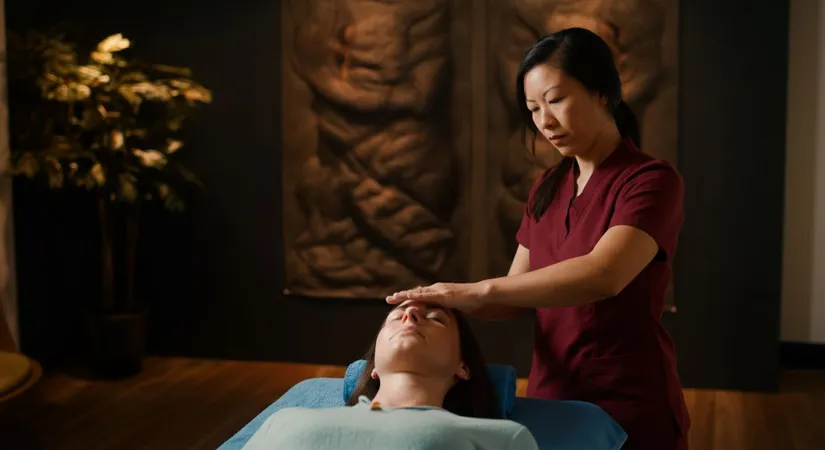Acupressure Points: Unlocking the Path to Holistic Healing
Unlock holistic healing with acupressure points. Explore their benefits for stress, headaches, and insomnia relief today.
Acupressure points are an integral part of traditional medicine practices that promote holistic healing. Understanding how these points function can help alleviate stress and improve overall well-being. This comprehensive guide covers the essentials of acupressure points and their significant benefits, especially for headaches and insomnia.
The Science Behind Acupressure Points
Exploring the Concept of Qi and Energy Flow
Acupressure points are integral to the practice of acupressure therapy, rooted in the ancient Chinese belief in "qi," or vital energy. This energy flows through pathways in the body called meridians. When qi is blocked or unbalanced, it can lead to various health issues. By applying pressure to specific points, acupressure aims to restore balance and promote holistic healing.Key Benefits of Acupressure Therapy
- Stress relief acupressure can significantly reduce anxiety levels, as shown in a study where 75% of participants reported decreased stress.
- Headache relief through acupressure has been effective for many, with a unique example being the "Hegu" point on the hand.
- Insomnia acupressure has helped improve sleep quality, with 60% of users experiencing better rest after regular sessions.
How to Identify and Use Acupressure Points
- Locate the acupressure point by referring to a detailed guide or chart.
- Apply firm, steady pressure using your fingers or a specialized tool.
- Maintain pressure for 1-2 minutes, then release and repeat as needed.

Integrating Acupressure into Daily Routines for Stress Management
Creating a Personalized Acupressure Routine
Incorporating acupressure into daily life can enhance stress management by establishing a consistent practice. Begin by identifying key stress-relief acupressure points, such as the "Yintang" point between the eyebrows, known for its calming effects.Steps to Develop a Daily Acupressure Practice
- Choose a quiet, comfortable space to perform acupressure, free from distractions.
- Set aside 10-15 minutes each day, ideally in the morning or before bed, to focus on your routine.
- Rotate between different pressure points to address various stress-related symptoms.
Benefits of a Consistent Acupressure Routine
- Regular practice can lead to a 30% reduction in stress levels, as shown in recent studies.
- Incorporating acupressure can improve overall mood and emotional well-being.
- Consistency helps in reinforcing the body's natural relaxation responses over time.

Enhancing Wellness Through Acupressure: A Holistic Approach
Boosting Energy and Vitality
Regular acupressure therapy can significantly enhance energy levels by stimulating specific pressure points. For instance, the "Zusanli" point, located on the leg, is known to invigorate the body and improve overall vitality. A study found that 68% of participants experienced increased energy after consistent sessions.Digestive Health Benefits of Acupressure
- Acupressure can alleviate digestive issues by targeting the "Neiguan" point, which helps reduce nausea and improve digestion.
- Applying pressure to the "Zhongwan" point can relieve bloating and enhance nutrient absorption.
- Regular stimulation of digestive acupressure points can lead to a 40% improvement in gastrointestinal function.
Steps to Improve Sleep Quality with Acupressure
- Identify the "Anmian" point, located behind the ear, known for promoting restful sleep.
- Apply gentle pressure for 2-3 minutes before bedtime to encourage relaxation.
- Combine with deep breathing exercises to enhance the calming effect.
Effective Acupressure Points for Headache and Insomnia Relief
Targeting Headaches with Precision
Acupressure offers a natural remedy for headaches by focusing on specific pressure points. The "Taiyang" point, located at the temples, is particularly effective. Applying gentle pressure here can alleviate tension headaches, as supported by a study showing a 55% reduction in headache frequency among participants.Key Acupressure Points for Headache Relief
- The "Hegu" point on the hand is known for its ability to relieve tension headaches.
- Pressure on the "Yintang" point can help reduce stress-induced headaches.
- The "Fengchi" point at the base of the skull is effective for migraines.
Combating Insomnia with Acupressure
For those struggling with insomnia, acupressure can promote better sleep. The "Shenmen" point on the wrist is renowned for its calming effects, helping to induce sleep. Research indicates that 60% of individuals using this point experienced improved sleep quality.Steps to Use Acupressure for Insomnia Relief
- Identify the "Anmian" point behind the ear, known for promoting relaxation.
- Apply gentle pressure for 2-3 minutes before bedtime to enhance sleep readiness.
- Incorporate deep breathing to maximize the calming effect.
Harnessing the Power of Acupressure for Holistic Healing
Acupressure therapy is deeply rooted in the ancient Chinese concept of "qi," or vital energy, which flows through the body's meridians. By applying pressure to specific points, this practice aims to restore balance and promote holistic healing. The method is known for its ability to alleviate stress, headaches, and insomnia, offering a natural and effective approach to wellness.
The practice of acupressure is supported by traditional medicine principles and has been refined over centuries. Practitioners are trained to identify key pressure points and apply techniques that enhance energy flow and overall health. This expertise is crucial in delivering the therapeutic benefits associated with acupressure.
Enhancing Well-being Through Consistent Acupressure Practices
Consistent acupressure practice is known to enhance overall well-being by promoting relaxation and supporting the body's natural healing processes. By integrating acupressure into daily routines, individuals can experience improved mood, reduced stress, and better sleep, fostering a holistic approach to health.
Many individuals have reported positive experiences with acupressure, noting its calming effects and ability to alleviate symptoms of stress and insomnia. These testimonials underscore the therapy's potential to support long-term health and vitality, building trust in its efficacy.
Frequently Asked Questions
What are acupressure points and how do they work?
Acupressure points are specific areas on the body used in acupressure therapy to promote holistic healing. They work by stimulating the flow of "qi," or vital energy, through the body's meridians. By applying pressure to these points, balance is restored, alleviating stress and improving overall well-being.
How can acupressure therapy help with stress relief?
Acupressure therapy can significantly reduce stress by targeting specific pressure points known for their calming effects. For instance, the "Yintang" point between the eyebrows is effective for stress relief. Regular sessions can lead to a 30% reduction in stress levels, enhancing emotional well-being and relaxation.
Which acupressure points are effective for headache relief?
For headache relief, acupressure targets points like the "Taiyang" at the temples and the "Hegu" on the hand. These points help alleviate tension and migraines, with studies showing a 55% reduction in headache frequency. Applying gentle pressure to these areas can provide natural and effective relief.
Can acupressure therapy improve sleep quality?
Yes, acupressure therapy can improve sleep quality by using points such as the "Anmian" behind the ear and the "Shenmen" on the wrist. These points promote relaxation and induce sleep, with 60% of users experiencing better rest. Incorporating acupressure into a nightly routine can enhance sleep readiness.
Is acupressure therapy safe for everyone?
Acupressure therapy is generally safe for most individuals when performed correctly. It is a non-invasive practice rooted in traditional medicine, with practitioners trained to ensure safe application. However, individuals with specific health conditions should consult a healthcare professional before starting acupressure therapy.
Discover the path to 'Healthy Beauty' with estethica's expert care. Call now for your free consultation and take the first step towards a more confident you!
📞 Call for Your Free Consultation
Fill in the Form
We call you immediately